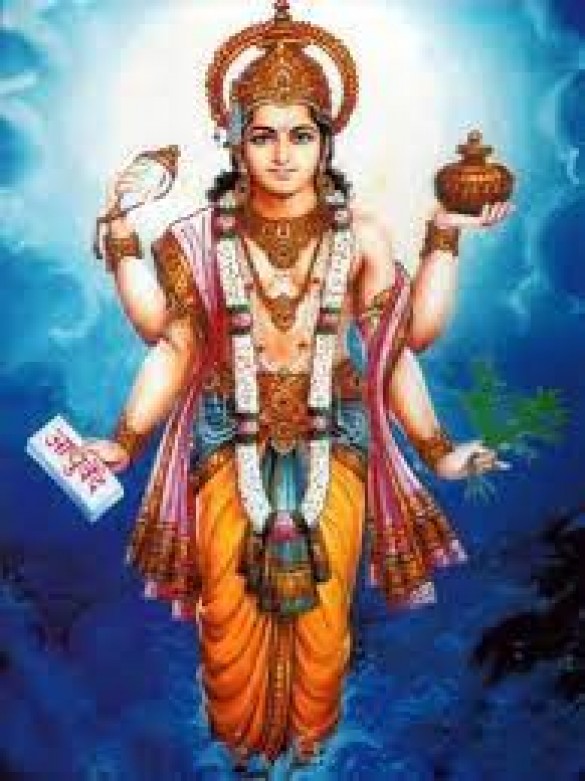
In the rich tapestry of Hindu mythology and ancient Indian scriptures, the name Dhanvantari holds a significant place. Revered as the divine physician and the father of Ayurveda, Dhanvantari is a symbol of health, healing, and well-being. His timeless legacy continues to inspire the practice of traditional medicine and holistic healing in the Indian subcontinent and beyond. The origin of Dhanvantari can be traced back to the ancient texts like the Puranas and the Vedas. According to the legend, Dhanvantari emerged during the churning of the cosmic ocean (Samudra Manthan) by the Devas (celestial beings) and Asuras (demons). As the churning proceeded, a pot of amrita (the nectar of immortality) surfaced. Dhanvantari appeared from the depths of the ocean, holding the pot of amrita, thus becoming the celestial healer and bestowing the gift of health and immortality to humanity.
Dhanvantari's divine attributes are not limited to his role as a healer. He is often depicted with four hands, holding a pot of amrita, a conch shell, a chakra (discus), and a leech (a traditional instrument used in bloodletting therapy). This symbolizes his association with both physical and spiritual healing, as well as his mastery over medicine and surgery. The importance of Dhanvantari's contributions to medicine and healing is underscored by his designation as the father of Ayurveda, the ancient Indian system of medicine. Ayurveda, which means the "science of life," is believed to have been revealed to sages by Lord Brahma and subsequently compiled in the form of ancient texts, such as the Charaka Samhita and Sushruta Samhita. Dhanvantari is credited with propagating and disseminating this invaluable knowledge to humanity, passing it down through generations.
The principles of Ayurveda emphasize the balance of the three doshas - Vata (air and space), Pitta (fire and water), and Kapha (earth and water) - in the body to maintain health and well-being. These doshas represent the fundamental energies governing physiological and psychological functions. Ayurveda advocates personalized treatments, herbal remedies, dietary guidelines, and lifestyle practices to prevent and cure ailments, taking into account an individual's unique constitution. The reverence for Dhanvantari as a divine healer is celebrated during the festival of Dhanteras, observed on the thirteenth day of the Hindu month of Ashwin (October-November). On this auspicious day, people express their gratitude to the divine physician and seek his blessings for good health and well-being. Offerings of lights, prayers, and rituals are performed in homes and medical institutions to honor Dhanvantari's healing prowess. The influence of Dhanvantari's wisdom extends beyond India's borders. In South-East Asian countries like Thailand and Cambodia, he is venerated as the "King of Medicine" and is depicted in numerous temples and sculptures.
In conclusion, Dhanvantari's significance as the divine physician and the father of Ayurveda remains an integral part of India's cultural heritage and traditional healing practices. His timeless legacy continues to inspire generations to prioritize health and embrace holistic approaches to well-being. Dhanvantari's association with Ayurveda symbolizes the ancient wisdom of healing and the harmonious relationship between nature and humanity. As humanity grapples with modern health challenges, Dhanvantari's teachings and the holistic principles of Ayurveda continue to serve as a guiding light for promoting wellness and nurturing the body, mind, and spirit.
Also read - Chanting these 108 names of Hanuman ji solves every problem
Sacred Stories: Why These Offerings Should Not Be Made on the Shivling
Offering Water to Shivling: Understanding the Correct Method